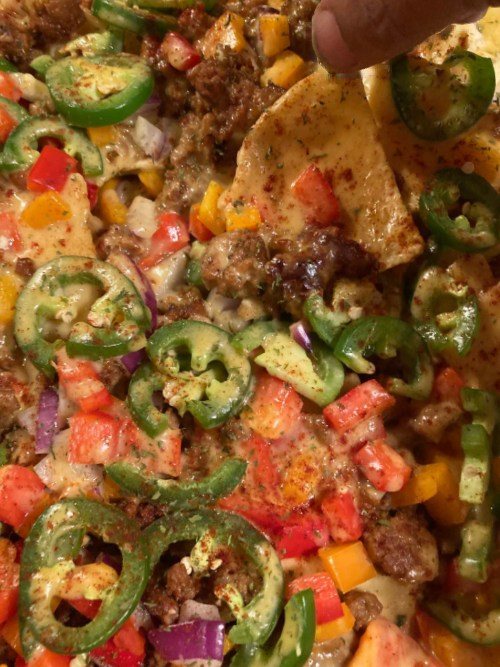ADVERTISEMENT
What truly elevates these nachos to the next level is the creative and nutritious selection of vegan toppings. From protein-packed black beans and hearty lentils to fresh, colorful vegetables and zesty homemade salsa, each component adds its own unique flair and nutritional benefits to the dish. These toppings not only enhance the flavor and texture of the nachos but also provide essential vitamins, minerals, and plant-based proteins, making them as nourishing as they are delicious.
For the crowning touch, a generous drizzle of dairy-free cheese sauce brings everything together in a creamy, decadent finale. Made from a blend of cashews, nutritional yeast, and spices, this homemade cheese sauce boasts all the flavor and richness of traditional cheese without any of the dairy. Its velvety smooth consistency coats each chip and topping, ensuring that every mouthful is bursting with flavor and satisfaction.
Whether you’re hosting a game night with friends, craving a midnight snack, or simply treating yourself to a solo indulgence, these Vegan Nachos are the perfect choice for any occasion. Easy to customize with your favorite ingredients and simple to prepare, they offer a convenient and delicious way to enjoy a classic comfort food staple without compromising your dietary preferences or values.
So gather your ingredients, preheat your oven, and get ready to experience nacho perfection—all while staying true to your vegan lifestyle. With these Vegan Nachos, you can have your favorite snack and eat it too, guilt-free and utterly delicious.
Here is some Important tips:
Gut Health:
Plant-based diets are often associated with improved gut health due to the high fiber content from fruits, vegetables, and whole grains. A healthy gut microbiome is linked to better digestion and overall well-being.
Anti-Inflammatory Properties:
Many plant-based foods have anti-inflammatory properties, which can help in reducing inflammation in the body. Chronic inflammation is associated with various health issues, and a vegan diet may contribute to its prevention.
Sports Performance:
Contrary to the misconception that vegan diets lack protein, many successful athletes follow plant-based diets to enhance their performance. Plant-based proteins can support muscle building and recovery.
Reduced Risk of Foodborne Illnesses:
Plant-based diets eliminate the risk of foodborne illnesses associated with the consumption of undercooked or contaminated animal products.
Economic Impact:
A vegan diet can be more economical as plant-based protein sources tend to be cost-effective compared to some animal products. It may be a budget-friendly option for individuals or families.
Mindful Eating:
Adopting a vegan lifestyle often promotes mindful eating. Being more conscious of food choices and sources can lead to a healthier relationship with food and a greater appreciation for the environmental impact of dietary decisions.
Preservation of Biodiversity:
The expansion of animal agriculture often leads to habitat destruction and loss of biodiversity. Choosing a vegan diet supports the preservation of ecosystems and the protection of various species.
Culinary Diversity:
Veganism introduces individuals to a diverse range of cuisines and ingredients from around the world. Exploring plant-based cooking can be a culinary adventure, embracing flavors and techniques from different cultures.
Reduced Antibiotic Resistance:
The use of antibiotics in animal farming contributes to the rise of antibiotic-resistant bacteria. Opting for a vegan diet can be a way to reduce the demand for such practices and promote responsible antibiotic use.
Cruelty-Free Beauty and Personal Care:
Veganism extends to beauty and personal care products. Choosing cruelty-free, vegan alternatives ensures that your lifestyle aligns with ethical choices beyond just dietary preferences.
ADVERTISEMENT
